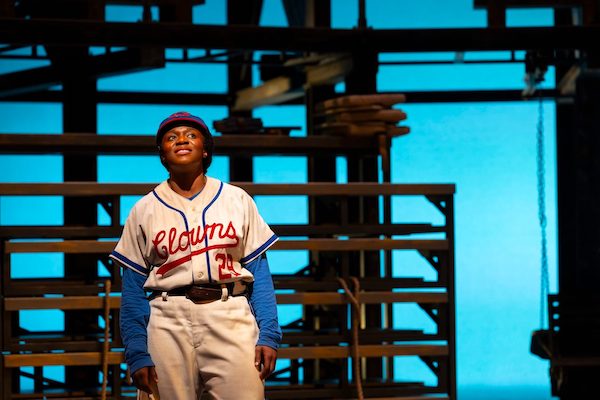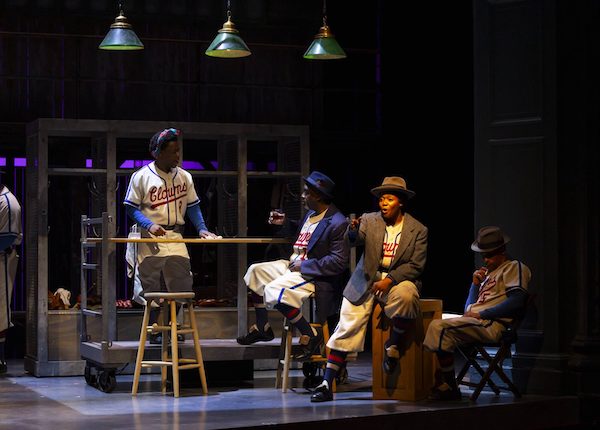Theater Review: “Toni Stone” — Winning Season
By Martin Copenhaver
The excellent ensemble of Huntington Theatre Company actors, fittingly, work well as a team.
Toni Stone, written and directed by Lydia R. Diamond. Staged by the Huntington Theatre Company, 264 Huntington Ave, Boston, through June 16.

Jennifer Mogbock in the Huntington Theatre Company production of Toni Stone. Photo: T. Charles Erickson
The story of Toni Stone is remarkable by any measure. It is all the more remarkable, then, that many of us had never heard of Toni Stone before seeing the eponymous play at the Huntington Theatre.
Stone was the first woman to play professional baseball in a predominantly male league. By all accounts, she was a gifted player. In 1953 she played second base for the Indianapolis Clowns of the Negro League, taking over that position from the great Hank Aaron when he left to play for the Milwaukee Braves. Stone was a solid hitter who loved to tell the story of how she once got a base hit off the legendary Satchel Paige. (Although her claim was never verified, it circulated widely because it was plausible.)
As gifted as she was, she had two strikes against her: She was a woman and she was Black. As a Black woman, she had no “league of her own.” Instead, she had to fight her way onto a man’s team.
Stone was signed to play on the Clowns by the white owner, Syd Pollock. He was impressed with her abilities, but he also thought the novelty of having a woman on the team would help sell tickets. At that time, the Negro League expected their players to be excellent at the game of baseball and, at the same time, to see themselves as entertainers. Picture the Harlem Globetrotters on a baseball diamond. It was a kind of minstrelsy — thus, the name for the team (“Clowns”) was fitting. In this production, not only is there much lighthearted horsing around during practice, there are also a couple of full-blown dance numbers, which exemplify the players’ anything-but-grim determination to entertain.

Left to right: Bobby Cius, Jonathan Kitt, Jennifer Mogbock, and Anthony T. Goss in the Huntington Theatre Company production of Toni Stone. Photo: T. Charles Erickson
The indignities endured by Stone only multiply once she signs on with the Clowns. She is harassed by teammates and refused a room in a boarding house by the very people who, earlier in the day, had cheered her play on the field. She also rails against the humiliation of facing pitchers who have been told not to bring their best stuff when she is at bat. She wants to be treated as an equal — in challenge, as well as opportunity. When hurt or frustrated, Stone seeks solace in a short stack of papers, smaller than baseball cards, she keeps in her pocket. On them are inscribed statistics that recount the feats of baseball’s best players. She handles the papers and recites the statistics as if she is saying the rosary, holding onto them like they are vested with holy power.
For much of the first act of Toni Stone, I longed for it to be a film rather than a play. In most respects, film is a medium that is better equipped to evoke the look and feel of baseball. Part of the allure of baseball is the spaciousness of it, providing open space in a cramped world. It is played in an arena that is called a “park” for good reason, on an emerald carpet under blue summer skies (at least, in our imaginations). By contrast, Collette Pollard’s inventive set for this production is largely brown and gray and, although the staging and choreography are evocative, the stage is confining whenever the cast simulates playing ball.
Playwright Lydia Diamond (who also directs this production) was determined to keep the focus on Stone, however, and in ways that are quite suited to the stage. This is not so much a baseball story as it is the story of a woman who played baseball. The play is punctuated by monologues by Stone and through them she gets to tell her own story. It is one of Diamond’s ways of giving Stone the ball and giving Stone her due.

Jennifer Mogbock in the Huntington Theatre Company production of Toni Stone. Photo: T. Charles Erickson
Although, arguably, this technique is used too frequently in the play, two of the most powerful moments are monologues. The first begins the play with Stone offering a rhapsody on the feel of a baseball and how it fits in the hand: “It feels like what your hand, my hand, wanted all along.” Her love of the game comes through immediately. My favorite moment in the play is Stone’s monologue that concludes the first act, in which she reflects on the ability of “her people” to use something like clowning for a higher purpose: “Our people always did have a way of turning what matters into something beautiful that touches the soul. We call that laughter and they call that clowning.”
The second act largely meanders among the same themes and conflicts that energize the first act. Then, suddenly, the play springs back to life (and the audience with it) during a brief but chilling encounter between Stone and a fellow player who finds her success threatening to his manhood. All the actors — with the exception of the actor playing Stone — are male. Although some play female characters in the course of the play, the overall effect is one of pervasive and oppressive maleness.
The excellent ensemble of actors, fittingly, work well as a team. As Toni, Eunice Woods (substituting for Jennifer Mogbock) carried the show in a demanding role, demonstrating a mix of pluck, determination, and vulnerability. Jonathan Kitt gives a strong and nuanced performance as Toni’s suitor, then husband, Alberga. The role requires an ability to evince both his genuine love for Toni and his desire to control her.
Of special note is the performance of Stanley Andrew Jackson as Millie, the hooker who becomes Toni’s confidant and advisor. It is easy to imagine this role devolving into the cliched “prostitute with the heart of gold.” Nevertheless, the part is written by Diamond, and played by Jackson, in ways that make this character both believable and compelling.
By coincidence, I saw Toni Stone the same day that Major League Baseball integrated statistics from the Negro Leagues into their official record book. In the process, baseball greats like Ty Cobb and Babe Ruth lost some of their records to counterparts in the Negro Leagues. For decades, the account of the excellence achieved by Black players was the greatest story never told. Now, they are finally receiving the recognition that was denied them for so long. Toni Stone’s story is remarkable, both as an account of a courageous and gifted individual, but also as emblematic of the epic struggle for justice that is not yet complete.
Martin B. Copenhaver, the author of nine books, lives in Cambridge and Woodstock, Vermont.
